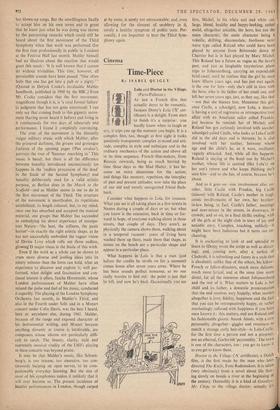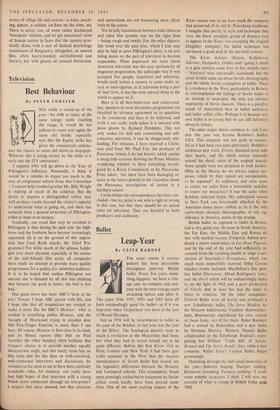Cinema
Time-Piece
By ISABEL QUIGLY
Air last a French film that actually dares to be romantic. Jacques'Derny's Lola ('X' cer- tificate) is a delight. From start to finish it's a surprise : you hardly know when to laugh or cry, it trips you up the moment you begin. It is a complex film, too, though at first sight it looks positively transparent: complex in mood and atti- tude, complex in style and technique and in the ordinary mechanics of the action and above all in its time sequence. French film-makers, from Resnais onwards, being as much harried by time these days as the Mad Hatter, it has be- come an extra dimension for the action; and things like memory, repetition, the interplay of past and present attitudes, now take the place of our old and mostly unrcgretted friend flash- back.
Consider what happens in Lola, for instance. What you see is all taking place in a few streets in Nantes during a couple of days or so; but what you know is the extension, back in time or for- ward in hope, of everyone walking about in those streets, that couple of days. They aren't, as physically the camera shows them, walking about in a temporal vacuum : years of living have washed them up there, made them that shape, as stones on the beach are a particular shape and appear in a particular place.
What happens in Lola is that a man (just before the credits he strolls on for a moment) comes home after seven years away. Where he has been sounds perfect nonsense, so no one really worries to find out : the point is just that he left, and now he's back. Occasionally you see him, Michel, in his white suit and white car, large, blond, healthy and happy-looking, rather stolid, altogether amiable, the hero, but not the main character, the main character being a volatile, drifting, disconsolate, footloose new- wave type called Roland who could have been played by anyone from Belmondo down to Charrier but is in fact played by Marc Michel. This Roland has a future as vague as the hero's past, and just as laughable (mysterious plane trips to Johannesburg, carrying an expendable brief-case), until he realises that the girl he once knew fifteen years ago, and has just met again, is the one for him—only she's still in love with the hero, who is the father of her small son, and left her seven years ago, just, as they say, like that —not that she blames him. Meantime this girl. once Cecile, a schoolgirl, now Lola, a dancer, is having a sort of regressive or retrospective love affair with an American sailor called Frankic. just because he reminds her of Michel; and Roland has got curiously involved with another schoolgirl called Cecile, who looks as Lola-Cecile did in the old days and is thirteen; he is also involved with her mother, between whose age and the child's he, as it were, oscillates, vaguely attracted. And, while all this happens, Roland is staying at the hotel run by Michel's mother, whose life is centred (like Lola's) on her son's return and who keeps thinking she's seen him—and so she has, of course, because he's about.
And so it goes on—one involvement after an- other, little Cecile with Frankie, big Cecile (almost) with Roland, Cecile's mother in tragi- comic involvements of her own, her brother- in-law being, in fact, Cecile's father; meetings and near-misses in the streets, in doorway s. in crowds; and so on, to a final idyllic ending; N\ nil all the girls at the night club in tears of joy and amiable envy. Complex, touching, unlikely--it might have been ludicrous but it turns out en- chanting.
It is enchanting to look at and splendid 10 listen to (Demy wrote the script as well as direct- ing); and, coming now, after a surfeit 01. Chabrols, it is refreshing and funny in a style that is absolutely unlike that of the others, his fellow- French or fellow-directors, much more delicate, much more lyrical, and at the same time more direct, for all the nonsense about Johannesburg and the rest of it. What matters to Lola is her child and its father, a domestic preoccupation that the end resolves very happily; what matters altogether is love, fidelity, happiness and the fact that you can be retrospectively happy, or rather everlastingly suffused with happiness if you have once known it : this matters, and not Roland and his fashionable gloom. Anouk Aimee, with a new personality altogether—giggles and sweetness to match a strange curly hair-style—is Lola-Cecile, for the first time a person and not a presence, not an ethereal, Garbo-ish 'personality.' '1 he to \\ is one of the characters, too : you get to know It as you get to know them.
Doctor in the Village ('A' certificate), a Dutch film, is the first made by the man who later directed The Knife, Forts Rademakers. It is taken (very obviously) from a novel about life flow- ing slowly on beside a river at the beginning 01 the century. Ostensibly it is a kind of Goodin e, Mr. Chips to the village doctor; actually it `;



























 Previous page
Previous page